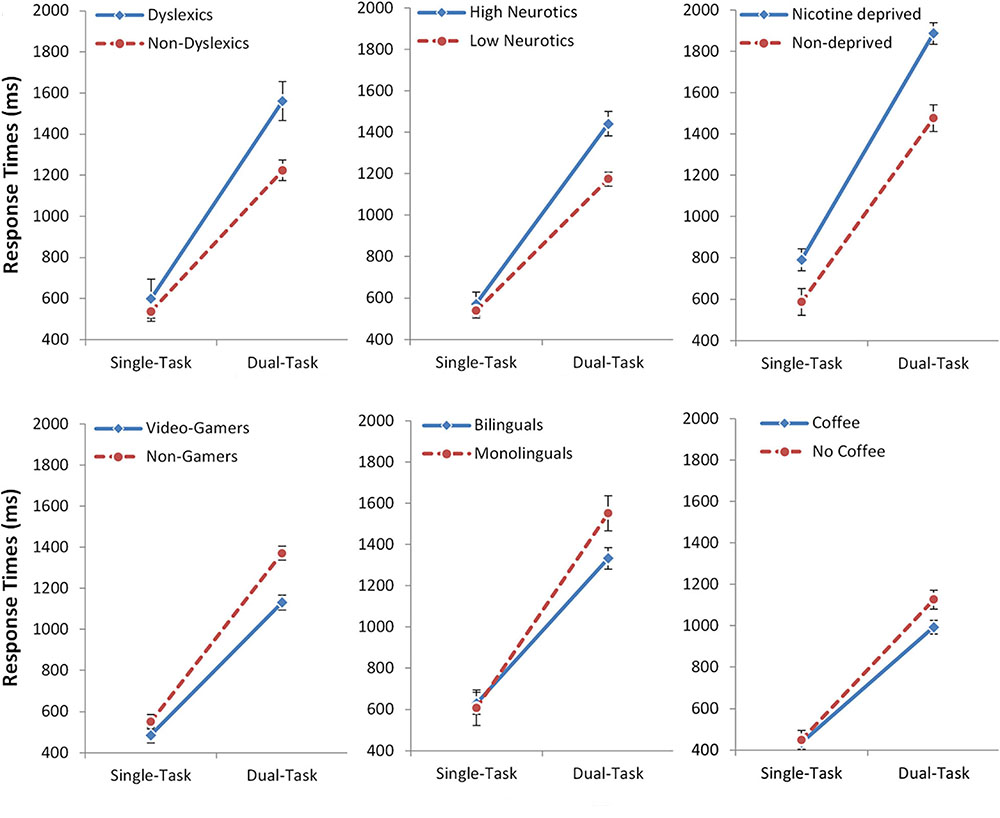Psychologists have revealed why some people, such as gamers and coffee drinkers, tend to be better multitaskers.
‘Executive function’ is our brain’s ability to deal with complex tasks such as self-control, planning, and switching focus. Certain groups of people have previously been shown to have better than average executive function, such as those that play lots of video games. Others meanwhile, such as those with dyslexia, have lower than average executive function.
While humans are capable of doing multiple things simultaneously – for example, seeing, hearing, walking and talking – we aren’t good at completing multiple complex tasks, and tend to hit a ‘bottleneck’ as our minds sort, prioritise and process what it wants the rest of the body to do next.
Now, Dr Andre Szameitat and his students from Brunel University London have demonstrated that it is our executive function ability that determines how quickly our brain is able to navigate this bottleneck when faced with multiple complex tasks.
While the difference in multitasking ability between those with high or low executive function is only a few milliseconds, the real-world difference can be significant – for example, someone with dyslexia has an average stopping distance over 3.3 metres longer than a non-dyslexic person when breaking from 30mph.
“Dividing our attention is possible, but it's rather tricky,” said Dr Szameitat, Reader in Psychology at the Brunel Centre for Cognitive Neuroscience. “For instance, if we retrieve something from memory, our mental system can't really do some other complicated thing simultaneously. Something in our mind is really limited to doing only one thing at a time.”
Until now, psychologists have disagreed on whether or not a cognitive bottleneck really exists, and if it does, what determines how quickly our thoughts can make it through – the so-called ‘refractory period.’
By showing that those with a high executive function are better at multitasking than those with low executive function, Dr Szameitat and his team believe that they have shown that such a bottleneck does exist, and the speed at which it is navigated is controlled by our executive function.
“I take it as an indication that when we have this attentional bottleneck, we need our executive functions to coordinate it,” said Dr Szameitat.
“If it doesn’t, we would say it shouldn’t matter whether you have better or worse executive function. But when we tested groups with good executive function – video gamers, bilinguals, and people who had just had a coffee before the session – they were actually better at multitasking than the other groups. So, this tells us that multitasking seems to be linked to executive function.”
To test their ideas, the team ran a series of experiments on 274 volunteers who fit into a category recognised as either having high executive function – gamers, bilinguals and coffee drinkers – or a category recognised as having low executive function – dyslexics, nicotine-deprived smokers, and people with above-average neuroticism.

The groups were asked to carry out two computer-based experiments designed to test their multitasking ability, and in both experiments those with low executive function scored lower than those with high executive function.
“The biggest difference we see is roughly a quarter of a second, which you probably wouldn’t notice. But that can translate into a huge difference in some situations – such as having to perform an emergency manoeuvre while driving,” said Dr Szameitat.
“It could be the difference between hitting someone in your car and being able to stop in time, so in pragmatic terms, it’s a very relevant effect.”
The paper, Inter-Individual Differences in Executive Functions Predict Multitasking Performance – Implications for the Central Attentional Bottleneck, was published by the journal Frontiers of Psychology.
Reported by:
Tim Pilgrim,
Media Relations
+44 (0)1895 268965
tim.pilgirm@brunel.ac.uk